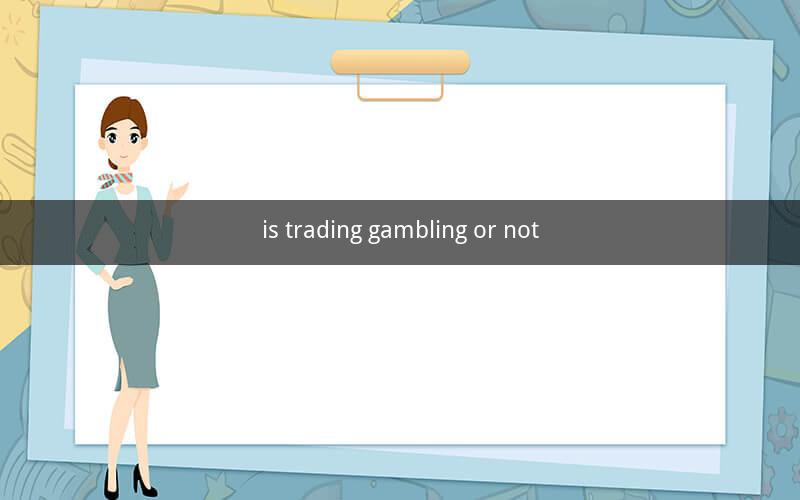
The Debate on Trading: Is It Gambling or a Legitimate Profession?
Table of Contents
1. Understanding the Basics of Trading
2. The Argument for Trading as Gambling
3. The Counterargument: Trading as a Skill-Based Activity
4. The Psychological Aspect of Trading
5. Legal and Ethical Considerations in Trading
6. Comparative Analysis with Gambling
7. The Role of Education and Experience
8. The Impact of Technology on Trading
9. The Importance of Risk Management
10. Conclusion
1. Understanding the Basics of Trading
Trading, in its simplest form, involves the buying and selling of assets such as stocks, currencies, commodities, or cryptocurrencies. It is a fundamental activity in the financial markets, where individuals and institutions seek to profit from the price movements of these assets.
2. The Argument for Trading as Gambling
Critics argue that trading is akin to gambling due to its speculative nature. They point out that both activities involve making decisions based on uncertain outcomes, and both can lead to significant financial gains or losses. The element of chance is often emphasized, suggesting that trading success is largely dependent on luck rather than skill.
3. The Counterargument: Trading as a Skill-Based Activity
Proponents of trading as a legitimate profession argue that it requires a unique set of skills, including market analysis, risk management, and emotional control. They believe that successful trading can be achieved through education, experience, and a disciplined approach, which contrasts with the notion of it being purely gambling.
4. The Psychological Aspect of Trading
The psychological aspect plays a crucial role in both trading and gambling. Traders, like gamblers, may experience similar emotions such as excitement, fear, and greed. However, successful traders learn to manage these emotions and make rational decisions, whereas gamblers may be more influenced by their psychological state.
5. Legal and Ethical Considerations in Trading
Trading is subject to legal and ethical regulations, which distinguish it from gambling. For instance, trading requires compliance with laws related to financial reporting, insider trading, and market manipulation. Ethical considerations, such as transparency and fairness, also play a significant role in maintaining the integrity of the financial markets.
6. Comparative Analysis with Gambling
While there are similarities between trading and gambling, there are also distinct differences. Trading involves complex strategies and analysis, whereas gambling often relies on chance and intuition. Additionally, trading can offer a more structured approach to risk management, which is typically not a feature of gambling.
7. The Role of Education and Experience
Education and experience are vital in trading, as they provide individuals with the knowledge and skills necessary to navigate the markets successfully. This stands in contrast to gambling, where experience may not necessarily translate into improved outcomes.
8. The Impact of Technology on Trading
Technology has revolutionized the trading landscape, providing traders with advanced tools and platforms to analyze markets and execute trades. This technological advancement has made trading more accessible and has contributed to its growing popularity, further blurring the lines between trading and gambling.
9. The Importance of Risk Management
Risk management is a critical aspect of trading, as it involves identifying and mitigating potential losses. Successful traders prioritize risk management over the pursuit of high returns, which is a key differentiator from gamblers who often prioritize luck over strategy.
10. Conclusion
The debate on whether trading is gambling or a legitimate profession is complex and multifaceted. While there are similarities between the two activities, the skill, discipline, and regulatory framework surrounding trading suggest that it is more akin to a profession than gambling. Ultimately, the success of a trader depends on their ability to combine education, experience, and emotional control with a disciplined approach to risk management.
---
Questions and Answers
1. Question: What is the primary difference between trading and gambling?
- Answer: The primary difference lies in the element of skill versus chance. Trading requires knowledge, strategy, and risk management, while gambling typically relies on chance and intuition.
2. Question: Can anyone become a successful trader?
- Answer: While anyone can become a trader, success requires a combination of education, experience, and emotional discipline.
3. Question: How does technology impact the trading landscape?
- Answer: Technology has made trading more accessible and efficient, providing traders with advanced tools for market analysis and trade execution.
4. Question: What role does risk management play in trading?
- Answer: Risk management is crucial in trading, as it helps to mitigate potential losses and protect the trader's capital.
5. Question: Can a trader control their emotions during trading?
- Answer: Yes, successful traders learn to manage their emotions through discipline and strategy.
6. Question: Is there a legal difference between trading and gambling?
- Answer: Yes, trading is subject to regulatory laws and ethical standards, while gambling is generally not.
7. Question: How important is education in trading?
- Answer: Education is essential in trading, as it provides the foundation for understanding market dynamics and developing effective strategies.
8. Question: What are some common mistakes made by traders?
- Answer: Common mistakes include lack of risk management, chasing losses, over-leveraging, and failing to adhere to a trading plan.
9. Question: Can trading be considered a form of entertainment?
- Answer: While trading can be enjoyable for some, it is primarily a profession that requires dedication and discipline.
10. Question: How does one differentiate between a trader and a gambler?
- Answer: A trader differs from a gambler in their approach to decision-making, risk management, and the reliance on skill and education rather than chance.